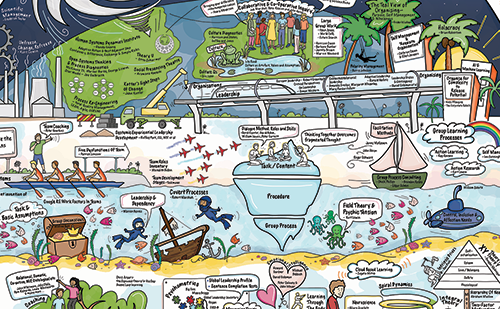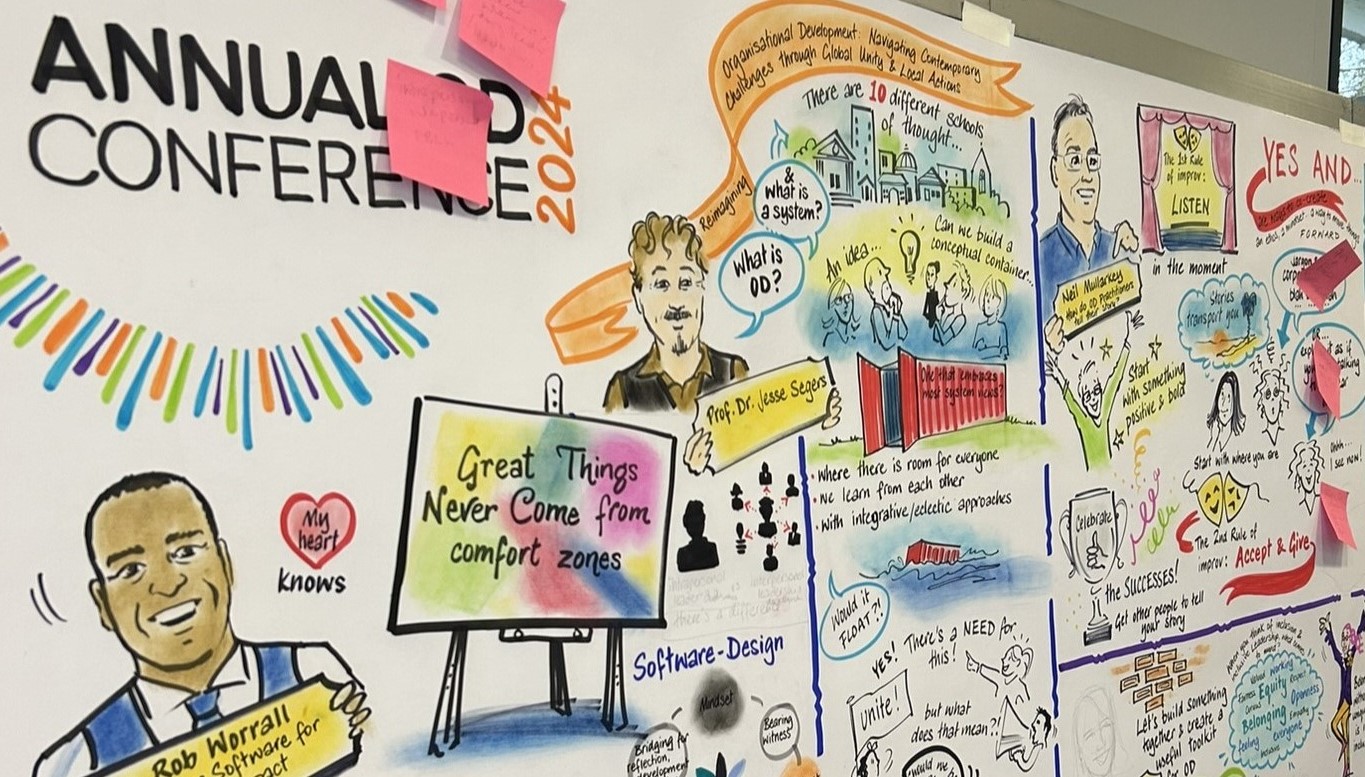Roffey Park Institute is an international centre of excellence for organisational development with a history of defining and developing innovative organisational development practice. This year, as part of our own ongoing practice development, we’ve created a new map of organisational development and here we interview Tom Kenward about this unique learning tool that you can download free of charge.
How does the process of mapping the field connect with self-managed learning?
We use the term mapping as being about setting out ideas, theories, contributors, perspectives and methods that we think relate to a given area of thought and practice. Mapping helps to address the issue of “but how do I get to learn about things I don’t even know I don’t know?”. Often, when people come to the field of people and organisational development, they aren’t sure where to start.

I meet many people who enter the OD profession from what they worry is in some way an illegitimate or inferior route, wondering if they deserve to have arrived in it and whether others will meet them in it supportively. Mapping, if held carefully, alleviates those “I’m not good enough” responses. It demonstrates the sheer diversity of the field today and in the past and that there are many aspects and routes to it that are useful. An IT network developer, general manager or administrator might have as much to learn from and bring to the field of OD as a transformation lead, an L&D manager or an executive coach. This realisation can be an important step toward a learner relaxing into and then getting excited about not knowing, realising that this is part of the learning process.
In the above realisation, mapping might also start to shift a hidden assumption that many of us have held since school or younger – that expert teachers know best what a learner should learn and how. I don’t think that is a particularly useful stance today, when the world is a complex and constantly changing place, where what knowledge is useful and the best way to build it is evolving every day. In this scenario, we believe that the role of those supporting a mapping process (and the rest of a self-managed learning process) for learners is to be aware of the nature of the adult learning process so that it can be handed to the learner as quickly and fully as possible for the learner to be in charge!
Building on these first two points, introducing the idea of maps prompts the learner to view knowledge as subjective. One person may see more value – and even truth – in a particular idea or perspective than another, because of factors such as upbringing, cultural context, gender, work experience and present professional responsibilities. This is not the same as saying everything is equally valid and that nothing is wrong professionally or morally, but it does suggest that we have to think more carefully about what we hold to be right, wrong or useful and who we trust to be sources of knowledge in this ‘post truth’ world.

What is self-managed learning?
It is a process. Of the learner taking responsibility for what they want to learn, how they want to learn it, what success will look like and how they will be held accountable for attaining that. How this translates practically depends on the length and depth of the programme it is being applied within, but the core principles remain the same:
- The learner sets their own learning goals, based on a combination of personal/professional interest and organisational/client need
- The learner seeks their own sources of knowledge through curating their own exploration of theory while also experimenting with new action in their workplace context, connecting theory and practice in the process
- The learner self-assesses their thinking and practice, while also getting assessment from other learners and faculty.
In the way we use it here at Roffey Park, in particular with our MSc in People and Organisational Development, these principles can be applied to gaining an academic qualification with a strong practical emphasis, or to a more vocational process focused solely on development of professional practice.
What did you learn about your own OD practice during the process of creating Roffey Park’s Organisational Development Map?
Perhaps it’s too obvious to say, but the map that has emerged (and my OD practice as a representation of that) is shaped by the people that I and colleagues have encountered in our learning and our work, through study and in the flesh.
There are hundreds of other people who have been influential in the field of OD in the past and today, but the weight I put on their work is less, not because the work may not be as useful but simply because I don’t know enough about it to judge. With a limited amount of space for content, judgements of inclusion and exclusion had to be made one way or another. And the same happens in my day to day choices about what I bring into my OD work.
It’s also reminded me that my own practice continues to evolve. For example, when I compare how I work today with what might be called diagnostic vs dialogic OD frames, I hold the two as more mutually useful and in tension rather than incompatible as I might have done a few years ago. They both represent parts of what I see in organisational life today, so being able to speak both languages and work across the tensions between them is useful, I think.
My OD work also holds, with more awareness these days, a tension between ideas of the self and the group. I see how western constructs of the self can leave us attached to our own individual experience of the world in a way that can make it harder to connect with others’ different experiences of the same phenomena, and then communicate and behave collectively and collaboratively in a group or team. It seems to me this is as central to the real work of OD as it was when Kurt Lewin and others began to look at the power of the self and the group back in the first half of the twentieth century.
Overall, this mapping process has reminded me again that the value of my practice to others may come more from the depth and quality with which I know things, as much as what I know.
How would you like people to use or connect with Roffey Park’s OD Map?
However they want! We use it in our programmes to help introduce ideas that we think are useful.

Beyond that, I hope that when people encounter it without us, it can still be a useful set of signposts toward finding out more about subjects of interest – I hope it can be used as a stimulus for learning about new areas of the field. If it creates a “wow, I haven’t heard of that!”, great. Equally “I’ve heard of her, but never actually looked into that idea, maybe I should”, that’d be good too. I also hope it can be a conversation starter – for people to tell us what we don’t know about the field and what they think should be on the next version – that’s how this version arose from the last. And for it to spark dialogue, disagreement, reaction – the map represents a set of choices which inevitably privilege some stories over others – I hope people will have a range of reactions to that which help us all learn more about the many diverse experiences we have of knowing about and working in the world of OD.
Mapping the field of OD – download a free jpg version
Roffey Park’s Map of OD by Roffey Park Institute is licensed under a Creative Commons Attribution-NonCommercial-NoDerivatives 4.0 International License. A high res version of the map is available for commercial use at a cost. Please contact us for more information.
Start a conversation with us!
How/What jumps out first? Why did you see that, do you think?
What do you only see when you really look?
How much of this is familiar to you? What is new to you?
Use #ODmap and tweet us @roffeypark or tag us on LinkedIn
MSc in People and Organisational Development
The MSc in People and Organisational Development is an innovative two-year, part-time Masters Qualification validated by the University of Sussex. This OD qualification programme deepens your theoretical knowledge and practical ability to transform organisations in a holistic way which brings the people along with you. It will increase your confidence, your personal impact, effectiveness and credibility in your role either inside an organisation or as an external consultant or change management practitioner. Roffey Park’s unique academic approach will empower you to pursue your own study path through the programme to tailor the outcomes to your current and future needs. Find out more about the MSc
OD Practitioners Programme
Our highly practical in-depth programme will equip you with a core understanding of what OD is, with practical OD tools and techniques; it will improve your skills and provide you with greater awareness of self and group process. We achieve this by bringing theory to life through practice – using your real world situations and experiences as the starting point for deep learning.
How Roffey Park helps your organisation benefit from Organisational Development
As more and more practitioners and clients are adopting the values and applying the principles of OD, we are working with a number of those organisations to build their capacity and confidence in taking an OD perspective and developing OD expertise.
To discuss your organisational development requirements in more detail, please contact us by email, or phone on 01293 851644





